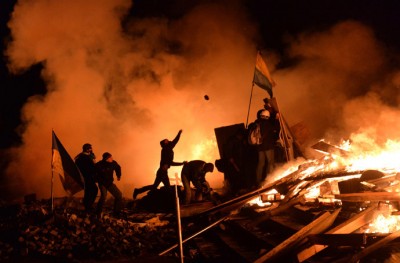Ukraine: One Year after the Coup
Global Research News Hour Episode 93

“If it is not announced by 10:00 tomorrow that Yanukovich is gone, we’re going to attack with weapons.” -Anonymous Protester speaking in Kiev’s Independence Square following the signing of a Compromise Deal between elected representatives of the Ukrainian Parliament, February 21, 2014 [1]
LISTEN TO THE SHOW
Length (59:05)
Click to download the audio (MP3 format)
The period from February 18 to February 23 marked the dramatic climax of the Euromaidan movement, a pivotal turning point in Ukraine’s political dynamics, and a watershed moment in the history of international relations.
Three months of street demonstrations and occupations of government buildings responded to with police crack-downs and mass arrests crescendo-ed to this turbulent five day period.
On February 20, Kiev saw the worst day of bloodshed it had seen in seven decades with 88 people being killed in a 48 hour period. [2]
On February 21, a Compromise Deal calling for early elections, constitutional reform and the withdrawal of forces both of authorities and the opposition “from administrative and public buildings” as well as “streets, city parks and squares.” [3]
This deal was rejected by the crowds gathered in Maidan Square. The next day, President Yanukovych had fled, and protesters had taken control of Presidential Administration buildings. Shortly thereafter a rump Parliament voted for Yanukovych’s impeachment, and set elections for May 25. [4]
In the days that followed, the Parliament would vote to ban Russian as a second official language, appoint Olexander Turchynov as interim president, and nominate Arseniy Yatsenyuk as Prime Minister.
The new Prime Minister would eventually sign the very Association Agreement with the EU which Yanukovych rejected, sparking the Maidan uprising. [5]
What followed was the secession of Crimea from Ukraine and rejoining Russia, together with rebellions in the East and South rejecting the authority of the Kiev government and sparking an ongoing civil war.
Media reporting on the Ukraine crisis has been dogged by allegations of mainstream media bias. In fact, the media literacy and watchdog group Project Censored has labelled ‘Media Hypocrisy in covering Ukraine Crisis‘ as one of the top 25 most censored stories of 2013-14. In particular, it is argued that the media has blocked out clear evidence of Neo-Nazi involvement in the overthrow of Yanukovych, and the extent to which it is US/NATO interests, more than Russian President Vladmir Putin, fostering the aggression.
One of the sources of this story is Robert Parry. Investigative Journalist Robert Parry is convinced this was a coup enabled by Neo-Nazis and provides the details, including the role of the Neo-Cons in fostering the Maidan protests, the failure of the media to responsibly report on the facts, and the motivation of the NeoCons to escalate the conflict with Putin potentially to a nuclear climax.
Rick Rozoff, manager of the STOP NATO list-serve breaks down the current situation in the wake of the Minsk Ceasefire, the victory of rebel forces at Debaltseve, and his take on whether Russia has a winning or losing hand in the ongoing conflict.
LISTEN TO THE SHOW
Length (59:05)
Click to download the audio (MP3 format)
The Global Research News Hour airs every Friday at 1pm CT on CKUW 95.9FM in Winnipeg. The programme is also podcast at globalresearch.ca .
The show can be heard on the Progressive Radio Network at prn.fm. Listen in every Monday at 3pm ET.
Community Radio Stations carrying the Global Research News Hour:
CHLY 101.7fm in Nanaimo, B.C – Thursdays at 1pm PT
Boston College Radio WZBC 90.3FM NEWTONS during the Truth and Justice Radio Programming slot -Sundays at 7am ET.
Port Perry Radio in Port Perry, Ontario –1 Thursdays at 1pm ET
Burnaby Radio Station CJSF out of Simon Fraser University. 90.1FM to most of Greater Vancouver, from Langley to Point Grey and from the North Shore to the US Border.
It is also available on 93.9 FM cable in the communities of SFU, Burnaby, New Westminister, Coquitlam, Port Coquitlam, Port Moody, Surrey and Delta, in British Columbia Canada. – Tune in every Saturday at 6am.
Notes:
1) Sabine Siebold and Natalia Zinets (February 21, 2014), Reuters; http://uk.reuters.com/article/2014/02/21/uk-ukraine-idUKBREA1H0EM20140221
2) BBC (November 13, 2014), Ukraine crisis: Timeline; http://www.bbc.com/news/world-middle-east-26248275
4) BBC (November 13, 2014) op. Cit
5) Adrian Croft (March 21, 2014), “European Union signs landmark association agreement with Ukraine” ;http://www.reuters.com/article/2014/03/21/us-ukraine-crisis-eu-agreement-idUSBREA2K0JY20140321

